
Atlas F1 Columnist
A year gone by without the commentary of Murray Walker, arguably the most famous Formula One TV commentator in the sport's history, and the enthusiasm of 'The Voice of Formula One' is very much missed - accentuating the lack of entertainment in 2002. For Murray himself, one would think a year has gone by resting at home and away from all the action - but Walker is incapable of sitting back and relaxing. Mark Glendenning met with the legendary anchorman in Melbourne, and heard from him about what he misses, what he remembers and what he regrets
It's now a little over a year since Walker's final sign-off, and Formula One misses him badly. Full credit to Michael Schumacher and Ferrari for a sensational year, but brilliance sure can become tedious sometimes. Walker couldn't have improved the racing itself, but his signature commentary style could certainly have made it a little easier to watch.
However, while Walker may have now retired, he has been far from idle. Putting the finishing touches to his autobiography was the main priority when he embarked on his post-F1 life, and he is now in the midst of a lengthy world-wide tour to promote it.
His schedule is a punishing one - easily as demanding as following the F1 circus for a full season, he tells me later - and on the morning that we meet in a quiet corner of the lobby of his hotel in Melbourne, it has taken its toll. The characteristic voice is immediately recognisable, but Walker himself is a little subdued, having been struck with a virus a couple of days earlier. No doubt the last thing he felt like doing was an interview, but nevertheless I was met with a friendly greeting, a firm handshake, and we got down to business.
I tell him that after having read his book, I was left with the overwhelming impression that he is terrible at relaxing. "Yes I am, I am terrible at relaxing," he agrees. "I always want to be doing something, and I'm no good at sitting down doing nothing."
But what drives him to keep so busy? "Well, first of all I'm gigantically interested in doing it," he says. "I suppose that's the basic reason. I was always very involved in my job in the advertising business and enjoyed the work enormously because I was dealing with very bright, ambitious, personable people, both at the agency and on the client side, which keeps you on your toes. And I can't conceive of anybody doing the job I did in commentary and not being interested in and excited by it. It was enormously stimulating work, travelling the world as I did, and being able to go anywhere and talk to anybody about something that was my central passion. I was a very lucky chap."
He was indeed, although as the cliche goes, you make your own luck. Walker had a blessed commentary career that stretched over half a century, during which he grew to become as integral a part of Grand Prix racing as the cars and drivers. Careers such as Walker's do not happen by accident, especially in the media, and even more especially when you're dealing with a sport as cut-throat as F1.
"I was very... I hesitate to use the word 'professional', because it sounds terribly pompous, but I made sure I kept the things in two separate compartments, and the one never intruded on the other. As far as I was concerned, my bread and butter and my future and my income depended upon me doing well in my advertising job. So the broadcasting was never allowed to intrude on that - my job was my number one.
"And so from Monday to Friday - and often on weekends as well if we were doing new client presentations - I was totally devoted to the job, and the broadcasting was my switch-off thing which happened at weekends. And for my holidays, I went to the Isle of Man and did the broadcast of the Tourist Trophy and that sort of thing.
"So, broadly speaking, my life was split into two distinct parts, which did not intrude on each other, and thank God I've got a tolerant and understanding wife who put up with it."
Spending two hours on the rev-limiter as Walker tended to do when he was commentating seemed to come naturally to him, and he has admitted many times that the reason he got so excited was simply because he is, by nature, an excitable chap. But I was curious to know just how demanding his job actually was.
"Yes, it is demanding!" he exclaimed. "It's demanding and stressful physically because of all the travel that's involved, and because when you're at a Grand Prix from Thursday right through to Sunday, you are on your feet the whole time talking to people, rushing around, looking at the cars, going to the commentary box. And it's very stressful mentally, because when you're doing commentary, it's for two hours on end, and I always stood up to do it, so that's tiring.
MG: I guess that the job of keeping people interested was made all the more difficult in situations like qualifying where there might not have been much going on for the first half hour.
Walker: "Yeah, that's always very difficult. I don't know what the answer to it is. When you're dealing with an hour and the viewers turn on expecting to see an hour of action and they get 35 minutes, it must be very frustrating and puzzling for them. It's difficult for them to understand why the cars have an hour available and only use half of it. And of course then you're continually having to explain that they only have 12 laps, and it only takes them about 18 minutes to do those 12 laps, and that they're always waiting for the others to go out and 'rubber up' the track for the conditions to be more suitable, which accounts for the long delays. And it's bloody hard work when you've got to fill in for 25 minutes, but that's part of the sport."
Walker's visit to Melbourne, Australia, took place just a few days before the heads of Formula One gathered at the London Heathrow airport to discuss various changes to the regulations. Walker, despite being retired, remains very much informed on the current affairs and tribulations of his favourite sport.
He says he likes the suggestions made to change qualifying, but the higher-profile suggestions from Ecclestone and FIA president Max Mosley seem to simply infuriate him.
"Absolutely ridiculous," he exclaims, when talking about the suggestion that drivers will swap teams throughout the season. "Words simply fail me. If the people who have put that idea up are supposed to be responsible, knowledgeable people about Formula One - which is a very serious sport that commands world-wide interest and vast financial interest as well - I don't know what they're doing there. To suggest that the drivers should change from team to team is too bloody ludicrous for words!
"I mean, I could go into chapter and verse, but obviously the whole art of Formula One is getting the car and the driver tuned together. Well, that's going to completely destroy that. What's going to happen to the sponsorship implications? It's got to be somebody putting it out with his tongue in his cheek very firmly. At least I hope it is, because if it's a serious suggestion, God help us."
Walker was similarly adamant against weight penalties - a suggestion brought by Ecclestone and, thankfully, rejected by the teams.
"The reason Ferrari are successful is because, having been in the wilderness for years, they've worked tirelessly to get their act together to eradicate the failing that they had before of not pulling together. So they got Jean Todt in, and Luca Montezemolo enables him to recruit Ross Brawn, Rory Byrne, Paolo Martinelli - a superb engine man, Schumacher ...
"Together, they have slogged away and got it right. And they are now reaping the reward which they richly deserve, and it's not up to the sport, in my opinion, to penalise Ferrari for being successful. It's up to their competitors, their rivals, to do better. And they know that, they don't need telling. And they are stunned by Ferrari's success, and will be busting a gut to catch up, particularly the McLaren and Williams. I feel vehemently that they should not contemplate fiddling about, but ideally, let nature take its course and let the others catch up.
"Ferrari's not going to be at the top forever. There have been plenty of precedents of other teams - Alfa Romeo, Mercedes-Benz, Cooper, Lotus, Williams, McLaren - they've all been dominant at some time or another, and they've all fallen, because the others caught up. And that's what will happen with Ferrari, although I don't know when."
He settles down a bit, as if catching for air, and smiles. "There's a fifteen-minute answer to your question!" he adds, laughing; it was the unmistakable display of enthusiasm which made him so popular as a TV commentator.
"I always regarded my target audience as not the dedicated nutter like you, or the dyed-in-the-wool anorak who knows all about from the year dot onwards, because they were going to listen whatever and whoever," Walker says, attempting to dissect the secret of his success.
MG: Were there any moments during the 2002 season where you thought, 'gee, I wish I'd been in the commentary box to call that one'?
Walker: "Yes, from the beginning to the end of all the races!
"I can't emphasise too strongly that I didn't stop because I wanted to stop. I stopped because I had been doing it for 52 years, which is a hell of a long time, and because I know that age withers. I am an old man, literally, and it's going to get to me. In the not-so-distant future there's going to come a time where either physically or mentally I won't be able to keep up with the travel and the stress and all the rest of it. And I wanted to go out with dignity at a time when I felt I was at the top and not on the way down with people thinking, 'he's past it, he should jack it in'.
"And it's very difficult to get the timing right. I mean, I know I could have done it this year, I know I could do it next year, but I don't know how long I could go on. All I do know is that I've got to stop some time, and I thought that I would rather stop too soon than too late. Whilst I would love still to be doing and know I could do, I am totally at ease with myself because I made the decision to stop rather than somebody else making it for me."
MG: Is there anything particular that you look back on after 52 years of broadcasting and think, 'I'm so glad I was there to see that'?
Walker ponders his answer for a while. "Well, first of all, almost anything to do with Nigel Mansell," he eventually responds. "He's a friend of mine and being English, I was naturally delighted that he won the World Championship and that I was there to call it, but also because wherever Nigel was, there was drama.
"His wheel nut was coming off in Hungary, or his wheel was coming off in Portugal, or he got Senna by the throat in Belgium, or he was marching down the pitlane to complain about something, or he was giving me a hard time doing the interviews. I mean, I had more memorable times from Mansell than all the rest of them put together.
"But obviously, interviewing Enzo Ferrari, interviewing Fangio, following Senna from his earliest Formula Ford days in Britain literally, sadly, to his death at Imola. Being there when Michael Schumacher hit the headlines in Belgium in 1991 and subsequently... Or seeing Damon Hill win the World Championship in 1996. I could go on indefinitely, but those are the things that hit me off the top of my head."
"Well, at the present moment it can only be David Coulthard or Jenson Button," he says, "because I don't think Eddie Irvine has got it in him to be World Champion, given whatever he's likely to be driving if he's at all going to continue to drive, and I don't know whether he is.
"But I have to say, with enormous reluctance and sadness, that David Coulthard, for whom I have profound respect as a gentleman and a dedicated craftsman, is going to be hard-put to win the World Championship for several reasons. The first is that the car is not good enough. Yes, the McLaren is very bloody good, but it's not good enough. And whether it will be good enough in comparison with the Ferrari within David's remaining time in Formula One, I don't know.
"But even if it is, he's got Kimi Raikkonen to cope with. And Raikkonen is not only as quick as David is now, but he's inexperienced and will get better as he gets more experience. But most of all, because there are no team orders at McLaren. So Raikkonen and Coulthard, as are Ralf Schumacher and Montoya, are going to be splitting the points between them, which makes it very difficult for David. I hope I'm wrong, I hate saying this. I sincerely hope I'm wrong. Nothing would give me greater pleasure than to see David Coulthard become World Champion, because he richly deserves it."
MG: That leaves Jenson Button...
Walker: "Well, I just don't know about Jenson. He had a brilliant debut with Williams, his year with Benetton meant nothing because the car was not good enough, his year with Renault has been... good, I think... But we still haven't seen Jenson Button, an experienced Jenson Button, in a car that's capable of winning. I would be mildly optimistic that he could become World Champion. So the short answer is, I don't know!"
As good as Walker was, he was helped out by a superb support cast. Very generally speaking, it is extremely rare to find a professional sportsman who can speak with the same eloquence and dexterity as they can compete. Walker was blessed to work with not one, but two.
"I did my first two years of Formula One - 1978 and 1979 - on my own, and I fiercely resented the advent of James Hunt, partly because I felt that I was doing a satisfactory job, and partly because I was worried that they were going to replace me with him," Walker recalls.
"However with experience, I know that the BBC Head of Sport Jonathan Martin's decision was absolutely right. Absolutely right. So with hindsight, I very much prefer working with somebody else, provided you can do it. I mean, provided that the two of you are prepared to make the sacrifices, the concessions to the other to enable the other chap to make a contribution. Which was something that I found difficult with James Hunt initially, because I am an enthusiastic gasbag and I was wanting to dominate the whole thing.
"I wasn't trying to dominate the whole thing so that I could push James out, I was just full of words which I wanted to get out and didn't want to let the other bloke get in. And there was a lot of friction over that. And also there were aspects of James that I did not respect, but eventually, we learned to accommodate each other. And although I was at the delivery end rather than the receiving end, so I don't really know, I'm told that this chemistry in the box was extremely good, and that the result from the viewers point of view was very entertaining.
"But Martin Brundle was a revelation. He is one of those rare things, as you said, a sportsman who can string not two words together but half a dozen words together. He knows what he's talking about, he talks about it extremely well, he's got a highly-developed sense of humour, and he's a team player. We got on well together in the commentary box and there was never any friction or problems at all, and he was an absolute joy to work with, and I believe the end result, from the viewer's point of view, was probably the best I have ever been associated with."
According to Walker, the relationship with Brundle gelled very quickly.
The one aspect of Walker's career for which he is perhaps best known are the infamous 'Murrayisms'. There are countless chapters of books, websites, audio recordings, magazine articles, and television segments that cover Walker's more memorable heat-of-the-moment slip-ups. But does he feel that the constant emphasis on the 'Murrayisms' has detracted from his other achievements with the microphone?
"Yes. Yes I do," he says. "I mean, being very serious, if I look deeply into my psyche, my personality, I suppose I am always going to feel sad about the fact that people's immediate association with me is of a seemingly bumbling buffoon who is constantly opening his mouth and putting both feet in it. Whereas I pride myself on the fact that I am very professional about what I do, I know what I'm talking about and believe I can talk about it. The 'Murrayisms' which people talk about are trivial things, those slips of the tongue, words coming out in the wrong order, momentary misidentification, malapropisms...
"But they're a result of my personality and my enthusiasm, and it has always surprised and pleased me, actually, that they appear to endear me to people and not actually put people off. So I suppose I ought to take the rough with the smooth."
So with 52 years of commentating now behind him, it seems that Walker has embarked upon a new career which simply involves being Murray Walker - much as Stirling Moss has done, very successfully, since his racing career ended with an horrific crash at Goodwood.
"I've been working at my hobby since 1949. My hobby has been broadcasting and motorsport. That is now denied to me as a result of my own decision, so I'll have to find something else to do. I think I finished the book by saying, 'one door closes and another opens' and it always has for me. People are still asking me to do all sorts of things associated with motorsport, and to do after dinner speeches, and to open things, and to write things. I don't have any reservations about having to be idle, which wouldn't suit me at all. There's going to be plenty I can do, but I'm not too sure what it is at the moment."
Speaking at a celebration to mark Murray Walker's final appearance behind the microphone at the 2001 United States Grand Prix, Eddie Irvine reportedly recalled how the Ferrari team used to analyse races by reviewing video recordings without any sound.
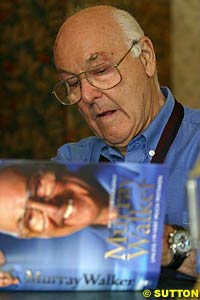 "Jeez, Murray, I never realised how dull some of them would be without your commentary," the Irishman said. According to Walker's autobiography, Irvine then turned to Bernie Ecclestone, saying, "We really ought to improve the show!"
"Jeez, Murray, I never realised how dull some of them would be without your commentary," the Irishman said. According to Walker's autobiography, Irvine then turned to Bernie Ecclestone, saying, "We really ought to improve the show!"
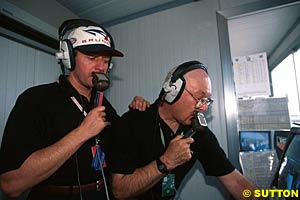 Walker was fortunate to have a personality and voice that matched the sport perfectly, and that no doubt helped him enormously, but the bottom line was that he was very good at what he did, and extremely smart. Long before he had amassed a fortune from racing, he had made a more than comfortable living in the advertising business. Indeed, for a long time, the two careers overlapped, however according to Walker, one never interfered with the other.
Walker was fortunate to have a personality and voice that matched the sport perfectly, and that no doubt helped him enormously, but the bottom line was that he was very good at what he did, and extremely smart. Long before he had amassed a fortune from racing, he had made a more than comfortable living in the advertising business. Indeed, for a long time, the two careers overlapped, however according to Walker, one never interfered with the other.
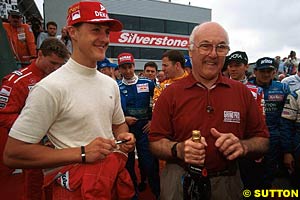 "But Formula One is allegedly the most difficult sport of all to commentate on, and it's not me saying that, it's the Head of Sport at the BBC, because unlike virtually any other sport that you can think of - football, tennis, boxing, athletics, which happen in the eye of the beholder in the grandstand - Formula One rushes past you once every one minute twenty seconds, and you have to be on top of the strategy and who the individuals are, and it was my job to keep people informed about a very complicated situation. So yes, it was stressful. But that doesn't mean to say that I didn't like it. I probably liked it because it was stressful!"
"But Formula One is allegedly the most difficult sport of all to commentate on, and it's not me saying that, it's the Head of Sport at the BBC, because unlike virtually any other sport that you can think of - football, tennis, boxing, athletics, which happen in the eye of the beholder in the grandstand - Formula One rushes past you once every one minute twenty seconds, and you have to be on top of the strategy and who the individuals are, and it was my job to keep people informed about a very complicated situation. So yes, it was stressful. But that doesn't mean to say that I didn't like it. I probably liked it because it was stressful!"
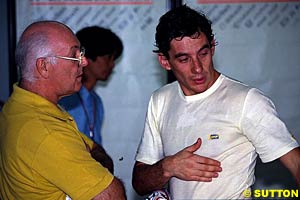 "Well, there again, I am in a state of despair if they meant that seriously," he states. "Formula One should be about technical excellence. It is supposed to be the pinnacle of the sport. Now everybody is in a lather at the moment because one team has dominated for two seasons, and one driver has dominated. The reason the driver has dominated is because he is the best in the world and one of the best of all time, and instead of bellyaching about it, I think people ought to appreciate their good luck in being alive to see - sorry, I'm being very pompous! - being alive and able to see a supreme craftsman who people will talk with bated breath in the future in the same way that I talk about Nuvolari and Fangio and Rosemeyer and Caracciola and people like that.
"Well, there again, I am in a state of despair if they meant that seriously," he states. "Formula One should be about technical excellence. It is supposed to be the pinnacle of the sport. Now everybody is in a lather at the moment because one team has dominated for two seasons, and one driver has dominated. The reason the driver has dominated is because he is the best in the world and one of the best of all time, and instead of bellyaching about it, I think people ought to appreciate their good luck in being alive to see - sorry, I'm being very pompous! - being alive and able to see a supreme craftsman who people will talk with bated breath in the future in the same way that I talk about Nuvolari and Fangio and Rosemeyer and Caracciola and people like that.
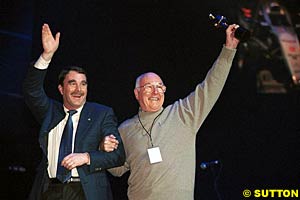 "I regarded my job as not just to inform but to entertain, and to try to grab the uninterested and uncommitted by the throat and say, 'This is fantastic, this sport. I love it, and you ought to love it too!' And I was enthusiastic about it because I am enthusiastic about it, and I was passionate about it because I am passionate about it, and hopefully my delivery and style got to the people, and I think it did get to the people that I was trying to get at, because thank God, I'm seeing them by the hundred at a time at these book signings that I'm doing. So I suppose I bought to it enthusiasm, passion, involvement, and an effort to entertain."
"I regarded my job as not just to inform but to entertain, and to try to grab the uninterested and uncommitted by the throat and say, 'This is fantastic, this sport. I love it, and you ought to love it too!' And I was enthusiastic about it because I am enthusiastic about it, and I was passionate about it because I am passionate about it, and hopefully my delivery and style got to the people, and I think it did get to the people that I was trying to get at, because thank God, I'm seeing them by the hundred at a time at these book signings that I'm doing. So I suppose I bought to it enthusiasm, passion, involvement, and an effort to entertain."
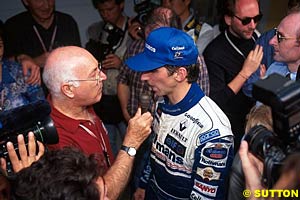 Walker was noted for wearing his heart on his sleeve, and if he ever faced criticism from the fans it was for his dogged support of Jenson Button even when he was clearly not always getting the job done. He was even more passionate about Damon Hill - it's hard to not remember Hill crossing the line to win the Championship in 1996 without also hearing a very emotional Walker ending his call with "... and I've got to stop now, because I've got a lump in my throat". But where is Britain's next Champion going to come from?
Walker was noted for wearing his heart on his sleeve, and if he ever faced criticism from the fans it was for his dogged support of Jenson Button even when he was clearly not always getting the job done. He was even more passionate about Damon Hill - it's hard to not remember Hill crossing the line to win the Championship in 1996 without also hearing a very emotional Walker ending his call with "... and I've got to stop now, because I've got a lump in my throat". But where is Britain's next Champion going to come from?
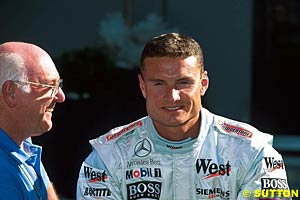 James Hunt stepped in as Walker's first co-commentator (prior to that, he has done the job alone), and once some initial tension between the pair was smoothed out, the partnership settled into a beautiful chemistry, with Hunt laconically providing a witty and insightful backdrop to Walker's enthusiasm. That ended sadly, when Hunt suffered a fatal heat attack, and after a brief appearance by Jonathan Palmer, Martin Brundle stepped into the sizeable void left by Hunt's absence. The result was magic.
James Hunt stepped in as Walker's first co-commentator (prior to that, he has done the job alone), and once some initial tension between the pair was smoothed out, the partnership settled into a beautiful chemistry, with Hunt laconically providing a witty and insightful backdrop to Walker's enthusiasm. That ended sadly, when Hunt suffered a fatal heat attack, and after a brief appearance by Jonathan Palmer, Martin Brundle stepped into the sizeable void left by Hunt's absence. The result was magic.
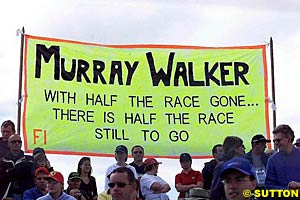 "Well, it was virtually instantaneous. I mean, he started in 1995 I think it was - the year he was sharing the Ligier with Aguri Suzuki. He was brought in by the BBC in addition to Jonathan Palmer for those races he wasn't driving in, and he immediately revealed that he was very good. 1996, I don't think we saw much of him, and then ITV decided they would use him instead of Jonathan Palmer. I think he had to put his foot down, which Martin is very good at doing in a nice way, at the beginning of our partnership, saying, 'Don't forget I'm in the box as well, mate.' But there was no friction, and I readily accepted that. So the partnership success was almost instantaneous, and certainly was very rapidly established and developed subsequently."
"Well, it was virtually instantaneous. I mean, he started in 1995 I think it was - the year he was sharing the Ligier with Aguri Suzuki. He was brought in by the BBC in addition to Jonathan Palmer for those races he wasn't driving in, and he immediately revealed that he was very good. 1996, I don't think we saw much of him, and then ITV decided they would use him instead of Jonathan Palmer. I think he had to put his foot down, which Martin is very good at doing in a nice way, at the beginning of our partnership, saying, 'Don't forget I'm in the box as well, mate.' But there was no friction, and I readily accepted that. So the partnership success was almost instantaneous, and certainly was very rapidly established and developed subsequently."
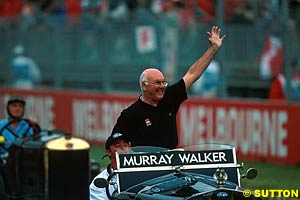 "People say, 'what are you going to do now?'" Walker concludes. "The short answer is I don't know, because most men, when they retire from their job, want to develop their hobby, which might be do-it-yourself carpentry, or collecting stamps, or whatever.
"People say, 'what are you going to do now?'" Walker concludes. "The short answer is I don't know, because most men, when they retire from their job, want to develop their hobby, which might be do-it-yourself carpentry, or collecting stamps, or whatever.
Please Contact Us for permission to republish this or any other material from Atlas F1.
|
Volume 8, Issue 45
Atlas F1 Exclusive
Interview with Murray Walker
Giancarlo Fisichella: Through the Visor
Columns
Bookworm Critique
Elsewhere in Racing
The Grapevine
> Homepage |